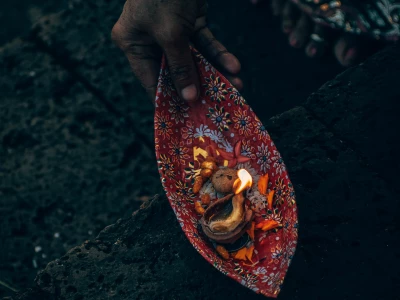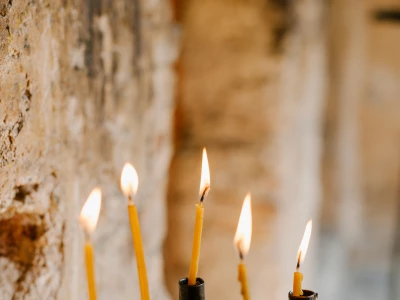Share this article
Remarkable Unknown Lives

' Do not neglect to show hospitality to strangers, for thereby some have entertained angels unawares.'
— Hebrews 13:2
The Legend Of The Tzadikim Nistarim
Maybe it's the road sweeper who brightens up even the gloomiest day when he bids you 'good morning' in that charming way of his. It could even be the young man who works at the customer service desk in your local supermarket who patiently and good-humoredly handles all those first-world 'problems' that the grumpiest customers seem to have. Or maybe it's the elderly, elegant lady who seems a permanent fixture, sitting beside her flower stall on the corner of the street, who, when she sees you, flashes you her enchanting smile. You will never know that one of these seemingly ordinary people might be one of the Tzadikim Nistarim, a notion rooted within Mystical Hasidic Judaism.
The legend of the Tzadikim Nistarim says that 'the hidden righteous ones' are thirty-six righteous people whose role in life is to justify the purpose of humanity in the eyes of God. It's inspired by Genesis 18, where Abraham asks the Lord how many righteous people living in Sodom would justify its continued existence. Because the world is full of corruption, the Lord is tempted to bring everything to an end. And yet, for the sake of the Tzadikim Nistarim, the world is spared.
The '36 righteous ones,' the legend states, are unrecognised souls that are even unknown to each other and that, if one of them realises their true purpose, they would never admit it.

'An emerald shines even if it's worth is not spoken of.'
– Marcus Aurelius, Roman emperor and Stoic philosopher.
I'm fascinated by the legend of the Tzadikim Nistarim. It ignites my imagination and reinforces my belief that some people who seem deceptively ordinary on the outside have, in reality, extraordinary inner lives and souls. One such rare individual was my late wife, Cushla. Her mystical gifts and spiritual greatness were mostly hidden. Only a few people recognised the remarkable soul she was. But this state of affairs suited her fine. Instead of drawing attention to herself, Cushla was always ready to serve others first. Her approach to life was similar to St. Thérèse of Lisieux, probably her favourite saint. For example, Thérèse lived a hidden life, and as she said herself, she 'wanted to be unknown'.
Cushla, too never sought recognition in any aspect of her life, especially her spiritual life. Even as a child, she had this attitude. After she died, I found one of her childhood diaries and was struck by her last entry at age fourteen: 'My life has its ups and downs, but I wouldn't like to be anyone else, not even a famous person.' She believed even before that tender age that life was, above all, about love, and like St. Thérèse, she didn't think it had to be expressed in a grandiose way:
In her quest for sanctity, St.Thérèse believed it wasn't necessary to accomplish heroic acts or great deeds to attain holiness and express her love of God. Her philosophy was later known as The Little Way, which she expanded on in her autobiography, Story of a Soul. 'Love proves itself by deeds, so how am I to show my love? Great deeds are forbidden me. The only way I can prove my love is by scattering flowers, and these flowers are every little sacrifice, every glance and word, and the doing of the least actions for love.'
Thérèse had died in obscurity, but soon after her death, Story of a Soul was published and became a worldwide best-seller. Her life and philosophy of The Little Way turned everything upside down. She reminded us that we don't have to be famous or achieve big things for our lives to be worthwhile and meaningful. Sometimes, though, it's hard for us to see this. Our materialistic society conditions us to view ourselves and others through the lens of fame, 'success', and our productivity level. Adapting this tunnel vision, we don't see life as God does. We have everything back to front and tend to look and judge people by sight, and we're very often wrong.
After years of seeking what I thought was success, Cushla's example inspired me to make a complete paradigm shift in how I saw things. For instance, I witnessed how she took care of others, who are not often valued according to the standards of this world:
Two of her siblings, Peter and Tricia, had long-term debilitating health problems. In her twenties, Tricia, the youngest in the family and devoted to Cushla, developed a rare neurological disorder called Charcot-Marie-Tooth. The disease, a hereditary motor and sensory neuropathy, leads to muscular atrophy. The condition gradually worsened, resulting in Tricia using a wheelchair and succumbing to an early death at age thirty-four in 2004.
Peter, Cushla's younger and only brother, was a mild-mannered and thoroughly good person, traits all of the Murphy family shared. Just like Tricia, he too was diagnosed with a serious illness in his twenties, only this time it was a mental disorder: schizophrenia. A few years later, he had to bear another cross when he suffered a stroke.

‘We don't have a soul. We are a soul. We happen to have a body.’
― C.S. Lewis, one of the most influential writers of the 20th Century. A brilliant and imaginative thinker, Lewis was a scholar and professor of English literature with positions at Oxford and Cambridge.
Just as she did with Tricia, Cushla constantly reassured and comforted Peter. She prayed ceaselessly for him as she did for all her family. Slowly he began to accept his condition. Mysteriously, after receiving one of her knowings *, she said to me: 'Peter's soul chose this suffering, and he is the highest soul in all the family.' Peter died in 2021, aged 59 ( Cushla died in 2008, aged 51). Out of a family of seven, only Joan, the eldest sibling, is still alive. 'My family were chosen to suffer,' Cushla told me after receiving another of her knowings. And yet, It was plain to see that they all had happy and peaceful lives. I realise the last statement may seem implausible to some people, given all their illnesses and relatively short lives, but knowing the family all these years, I believe it to be true. I also do not doubt that Cushla contributed enormously to their happiness. Although she bore her own debilitating illness and had other responsibilities, she made sure they never wanted for anything. She had lit up their lives with her love and zany sense of humour, a quality which they all shared and enjoyed.
When I pass Cushla's childhood home, I often think: 'Nobody knows, but that's where a saint lived with her beautiful family'. Although she wasn't famous or recognised by the world, she had succeeded at what mattered: she had loved others immeasurably and climbed the spiritual mountain.
The visionary Anne, a lay apostle, describes one of her spiritual locutions regarding 'The Mountain' in her book Serving in Clarity: 'I see that God is sending light in a generous way through those on the mountain. The higher the souls are on the mountain, the greater the blast of light that flows through them. There are many obscure souls who are sending terrific amounts of light into the world and are completely unaware of how God is counting on their holiness as one of His assets during this time of emergency.'
I believe Cushla was one of those obscure souls Anne is referring to. Inspired by this notion and her heroic, fearless and extraordinary spiritual life, I have given the title The Unknown Mystic to her memoir, which I hope to publish soon.
More Quotes:
‘The growing good of the world is partly dependent on unhistoric acts; and that things are not so ill with you and me as they might have been, is half owing to the number who lived faithfully a hidden life and rest in unvisited tombs.’
—George Elliot (pen name of Mary Ann Evans), English novelist, poet, journalist and one of the leading writers of the Victorian Era.
Notes:
* Knowings. I don't mean knowing in the ordinary sense of the word. Cushla's knowings were, instead, a higher form of knowledge she drew from deep within her soul. It was a gift she shared with well-known mystics.
Share this article
Categories
in your inbox

Seeing The Unseen









